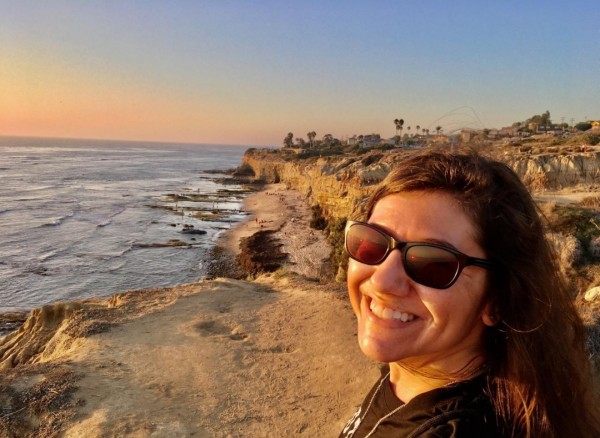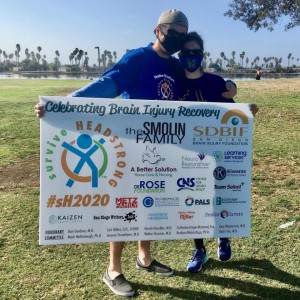 Albuquerque, New Mexico native Lauren Furey sold raffle tickets to move to San Diego, California to attend the afternoon Acquired Brain Injury (ABI) Program at San Diego College of Continuing Education (SDCCE). The non-fee classes at SDCCE are some of the only ones of their kind in the nation that support survivors recovering from brain trauma, stroke/aneurysm, brain tumor, brain infection and anoxia.
Albuquerque, New Mexico native Lauren Furey sold raffle tickets to move to San Diego, California to attend the afternoon Acquired Brain Injury (ABI) Program at San Diego College of Continuing Education (SDCCE). The non-fee classes at SDCCE are some of the only ones of their kind in the nation that support survivors recovering from brain trauma, stroke/aneurysm, brain tumor, brain infection and anoxia.
“SDCCE’s ABI program is everything to me, it changed my life. I went from sleeping in my car to living in a home with two stroke survivors,” said Furey, 34. “The faculty there really want us to be successful, whatever that means to us.”
Free ABI classes take place at SDCCE’s Educational Cultural Complex in Mountain View, CE-Mesa in Clairmont, and virtually through Zoom. Courses are open-entry/open-exit and students can enroll at different points in the semester.
“The absence of tuition to go to SDCCE plays a crucial role in comforting my family,” said Furey. “There is nothing else like it anywhere else. At SDCCE, there is no co-pay or a cap on how many sessions you can attend.”
The lifetime costs of a patient’s treatment for a traumatic brain injury (TBI) are estimated to run from $85,000 to $3 million, reported Northwestern Now. Findings show the cost of TBIs depends on the required level of care, duration, and insurance coverage.
“While SDCCE's ABI programs are not meant to be or replace rehabilitation, families choose us once insurance funding is depleted because we are exclusive to brain injury,” said Heike Kessler-Heiberg, SDCCE’s Associate Professor and coordinator for the ABI Programs, as well as a speech-language pathologist. “We are an academic setting, teaching strategies and coping skills, available to survivors as part of the continuum of care, since brain injury is considered a chronic condition.”
On September 25, 2016, Furey woke up to a different world. She was diagnosed with an anoxic brain injury with anterograde amnesia.
“It was exactly like the film, 50 First Dates. I was filled with sadness and confusion,” said Furey, 34. “I didn’t know what year or day it was, where I was located, but I knew I was in the same hospital where my husband passed away two years ago.”
 Determined to get better and her lungs stronger, Furey was discharged from the hospital to begin the recovery process. When returning home, she found a note from her friend explaining the brain injury. “I needed that note for six months. I read it every day until the fact that I had an injury shifted to long-term memory.”
Determined to get better and her lungs stronger, Furey was discharged from the hospital to begin the recovery process. When returning home, she found a note from her friend explaining the brain injury. “I needed that note for six months. I read it every day until the fact that I had an injury shifted to long-term memory.”
Following the diagnosis, Furey attended a psychosocial rehabilitation in Albuquerque. Although she enjoyed the therapy, she desired a facility specializing in ABI recovery. During an online search, Furey found the San Diego Brain Injury Foundation which introduced her to the ABI program at SDCCE in June 2018.
SDCCE’s ABI program is led by faculty who are speech pathologists, rehabilitation counselors, and recreation therapists. The curriculum retrains students to achieve daily tasks and long-term goals to support their transition back into more independent living, volunteering, and career and educational pursuits.
For seven months, Furey made the commute from Albuquerque to San Diego during the summer and fall 2018 semesters to live in the city and take classes.
“I was nervous. I did not know what the first day of brain injury school would be like. I wondered if there were others like me,” she said, remembering her first experience. “I met another student that day. I'll never forget hearing another survivor’s voice, telling me it’s okay and that this is where I should be.”
Although SDCCE’s ABI classes are free, Furey would house sit and take care of pets to cover commuter living expenses back and forth to San Diego, until she decided to make her stay permanent at the start of the spring 2019 semester.
Back home in Albuquerque, she reached out to local businesses for donations toward a raffle ticket fundraiser, to relocate near SDCCE. Compelled by her story, Furey received an outpouring of restaurant gift cards and automotive services including oil change gift certificates, which she sold for five dollars per ticket to friends and family. “It was incredible. My community helped in a big way,” she said.
Prior to her diagnosis, Furey attended the University of New Mexico as a psychology major. Due to the acquired brain injury during her junior year and her commitment to rehabilitation, school was put on hold. She explains that the student accommodations given inside SDCCE’s ABI program such as carbon copy notes and lecture recordings showed her that continuing a college education is still possible.
Furey aspires to go to graduate school to become a grief counselor to counsel people of all backgrounds. “It doesn’t matter if someone has an acquired brain injury, if they’re low-income, middle class, absolutely anyone and everyone needs support,” she said. “There is no one box to put someone in. Every recovery is different.”
In addition to changing lives in the classroom, students, faculty, and administrators of SDCCE’s ABI program have raised over $220,000 for the San Diego Brain Injury Foundation (SDBIF) as they participate each spring in the foundation’s annual surviveHEADSTRONG Walk for Recovery. Kessler-Heiberg has served on the SDBIF board since 2011.
SDCCE is currently enrolling. To register for any of the ABI Programs, contact Brandi Bass at bbass@sdccd.edu or for more information, visit, SDCCE.EDU
619-319-0209
alluragaris@gmail.com